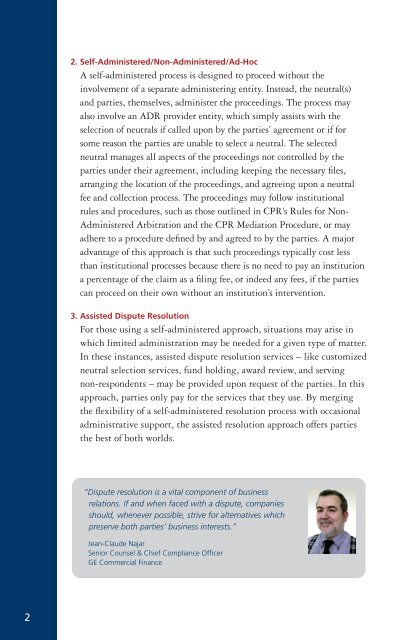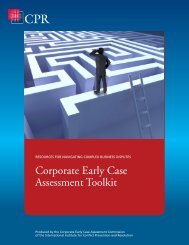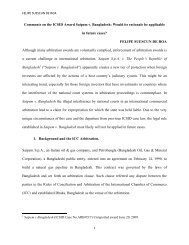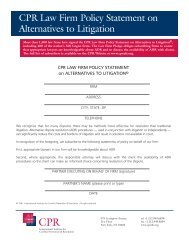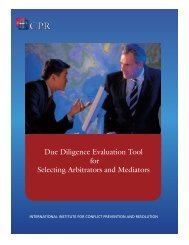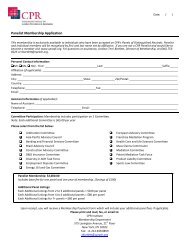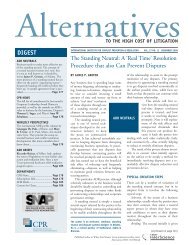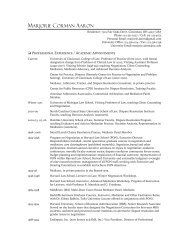CPR's Guide to Self-Administered ADR - CPR Institute for Dispute ...
CPR's Guide to Self-Administered ADR - CPR Institute for Dispute ...
CPR's Guide to Self-Administered ADR - CPR Institute for Dispute ...
Create successful ePaper yourself
Turn your PDF publications into a flip-book with our unique Google optimized e-Paper software.
2. <strong>Self</strong>-<strong>Administered</strong>/Non-<strong>Administered</strong>/Ad-Hoc<br />
A self-administered process is designed <strong>to</strong> proceed without the<br />
involvement of a separate administering entity. Instead, the neutral(s)<br />
and parties, themselves, administer the proceedings. The process may<br />
also involve an <strong>ADR</strong> provider entity, which simply assists with the<br />
selection of neutrals if called upon by the parties’ agreement or if <strong>for</strong><br />
some reason the parties are unable <strong>to</strong> select a neutral. The selected<br />
neutral manages all aspects of the proceedings not controlled by the<br />
parties under their agreement, including keeping the necessary files,<br />
arranging the location of the proceedings, and agreeing upon a neutral<br />
fee and collection process. The proceedings may follow institutional<br />
rules and procedures, such as those outlined in <strong>CPR</strong>’s Rules <strong>for</strong> Non-<br />
<strong>Administered</strong> Arbitration and the <strong>CPR</strong> Mediation Procedure, or may<br />
adhere <strong>to</strong> a procedure defined by and agreed <strong>to</strong> by the parties. A major<br />
advantage of this approach is that such proceedings typically cost less<br />
than institutional processes because there is no need <strong>to</strong> pay an institution<br />
a percentage of the claim as a filing fee, or indeed any fees, if the parties<br />
can proceed on their own without an institution’s intervention.<br />
3. Assisted <strong>Dispute</strong> Resolution<br />
For those using a self-administered approach, situations may arise in<br />
which limited administration may be needed <strong>for</strong> a given type of matter.<br />
In these instances, assisted dispute resolution services – like cus<strong>to</strong>mized<br />
neutral selection services, fund holding, award review, and serving<br />
non-respondents – may be provided upon request of the parties. In this<br />
approach, parties only pay <strong>for</strong> the services that they use. By merging<br />
the flexibility of a self-administered resolution process with occasional<br />
administrative support, the assisted resolution approach offers parties<br />
the best of both worlds.<br />
“<strong>Dispute</strong> resolution is a vital component of business<br />
relations. If and when faced with a dispute, companies<br />
should, whenever possible, strive <strong>for</strong> alternatives which<br />
preserve both parties’ business interests.”<br />
Jean-Claude Najar<br />
Senior Counsel & Chief Compliance Officer<br />
GE Commercial Finance<br />
2


